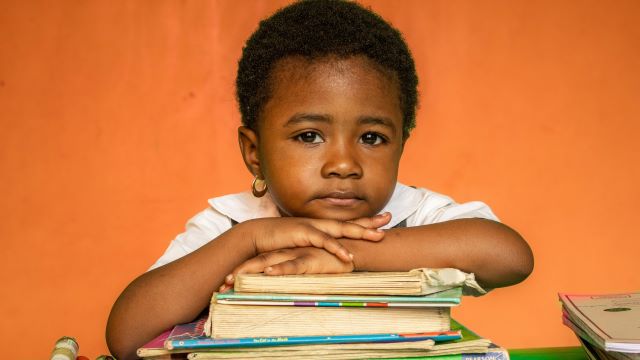KEMBE, Central African Republic — At first light, a thin red haze rises over the savanna as a dented Toyota Land Cruiser navigates the ruts of a dirt track. Wooden crates fill the back, their contents shifting with each jolt. Inside are books — hundreds of them — bound for a school with no shelves, in a village without a single bookstore, in a region where reading has often been more aspiration than habit.
In much of rural Central African Republic, decades of political instability and chronic underinvestment have hollowed out public infrastructure. Here, 200 miles from Bangui, electricity falters, the internet is scarce, and printed materials are rare. Yet, once a week, if weather and security allow, the mobile library arrives.
When it does, the scene is almost ritual. Children run to meet the vehicle, calling to one another. For them, the weekly visit is not merely a delivery. It is an event.
Literacy in the Central African Republic hovers below 40 percent, according to UNICEF. In the countryside, many schools operate without chalkboards, let alone libraries. The arrival of mobile book trucks, then, is both a symbol and an instrument of resilience — an effort to place stories, knowledge, and history in the hands of those who might otherwise never hold them.
A Grassroots Network of Pages and Wheels
Launched in 2019, the initiative Livres Sans Frontières Centrafrique began modestly: a single motorcycle carrying a backpack of donated paperbacks. Today, it operates a small fleet serving nine prefectures. Support comes from the Institut Français, logistical assistance from UNESCO’s Regional Office for Central Africa, and in-kind donations from libraries in France, Canada, and Senegal.
Its founder, former literature teacher Didier Goumba, recalls that waiting for brick-and-mortar libraries was not an option. “If the readers cannot reach the books,” he said, “the books must find the readers.”
Lessons Under the Mango Tree
In Dimbi, children gather beneath a broad mango tree as a librarian spreads a selection across a plastic sheet. Some titles are in French, the country’s official language; others are in Sango, spoken in most homes. The collection includes illustrated folktales, beginner readers, and worn textbooks salvaged from neighboring countries.
Local educators stress the importance of teaching in Sango. Until recently, printed materials in the language were scarce. The program has partnered with Central African writers and illustrators to produce children’s books rooted in oral traditions, printed in Bangui and distributed by the library trucks. Some visits double as impromptu theater, the reading of a folktale accompanied by gestures, song, and laughter.
Obstacles on the Road
The routes are often precarious. In the rainy season, rivers swell over low crossings and dirt roads dissolve into deep mud. In some regions, armed groups still control stretches of the countryside, making travel impossible.
The program’s survival rests on fragile funding — a mix of donor grants and volunteer labor. Vehicles require constant repair. Fuel prices fluctuate sharply. Librarians, often former teachers, receive modest stipends and depend on the hospitality of village leaders for safe storage and lodging.
“The state lacks the resources to meet these needs,” said Marcelin Deya, an advisor to the Ministry of Education. “Civil society is filling the gap.” That gap remains substantial: fewer than 5 percent of the country’s estimated 10,000 primary schools have functioning libraries.
More Than Words
For children in towns like Boda, the library represents possibility. One student, 11-year-old Christelle Ndoutou, spoke of thinking books were “only for children in Bangui” — until the mobile library arrived. Now, she says, she hopes to become a teacher.
The program’s reach has expanded beyond literacy. Human Rights Watch reported in 2023 that dropout rates have slightly declined in participating schools. Reading clubs now meet in markets and churches, often with mothers learning alongside their children.
In May, the government announced a partnership with UNHCR to extend the mobile libraries to refugee camps along the Chadian border, aiming to foster cohesion through shared access to books.
A Future Written in Ink
As the day fades in Kembe, the library truck prepares to leave. Some children linger under trees, reading aloud in pairs. Others simply turn the pages in silence, as though reluctant to let go.
In a country still recovering from conflict, the return of books is modest in appearance but weighty in significance. They arrive quietly, on battered wheels, carrying with them a vision of an educated future — one page at a time.
Sources:
- UNICEF Data: Literacy Rates in the Central African Republic (2023).
- Human Rights Watch. A Step Toward Learning: Education Access in Rural CAR. (2023).
- UNESCO Regional Office for Central Africa: Education Support Programs (2024).
- Institut Français: Cultural Cooperation Initiatives in Central Africa (2024).


